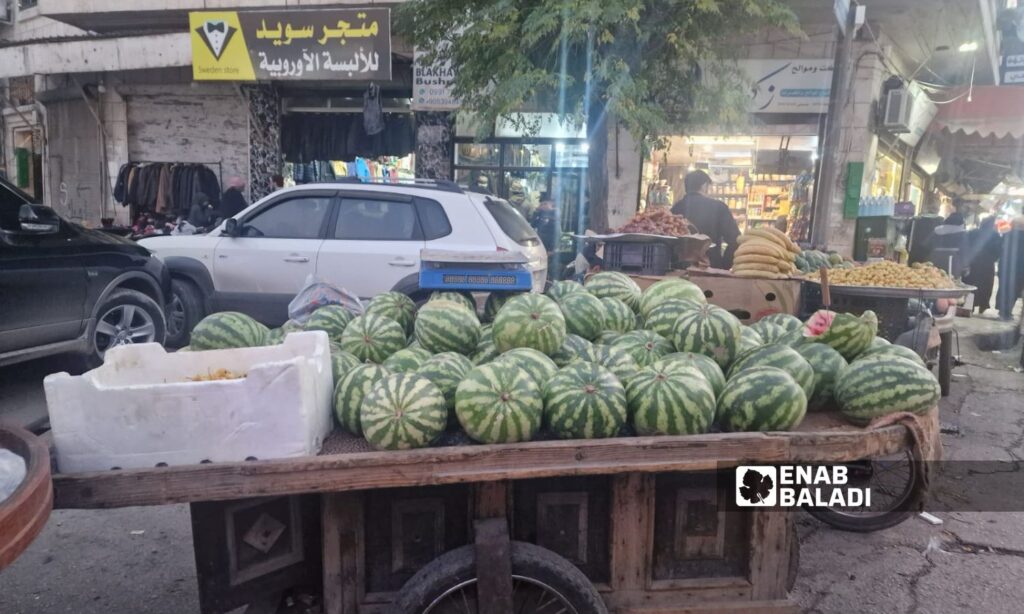After much effort and searching, Amer managed to secure a watermelon for his pregnant wife, as she wanted to taste it, despite the watermelon season having ended two months ago in Idlib, northwestern Syria.
The young man displaced from rural Homs is keen to meet his wife’s desire as a way to celebrate her first pregnancy, especially after a five-year delay due to health reasons.
Amer (33) told Enab Baladi that his wife desired to eat watermelon, which disrupted him since the season had ended, but he found what he was looking for at a fruit seller in Idlib after asking several vendors.
Storing watermelons at the end of the season is a rare practice carried out by a small number of farmers in Idlib to preserve some of the watermelons.
There are also some specialized fruit shops that ensure the supply of fruits and vegetables even outside their seasons by importing or storing them.
Watermelon storage
Some farmers store watermelon by leaving some fruits in place without harvesting, adjusting the position of the watermelon on its base, and covering it with large amounts of straw, which preserves the watermelon for two consecutive months.
The watermelon season in Idlib starts in July and lasts until mid-September. The storage process helps to secure watermelons until the end of November at the latest if all storage conditions of a dry and cool environment are met.
Adel Fakhri, owner of the “Fruit Kingdom” shop in Idlib, told Enab Baladi that only a few farmers store watermelons due to the significant risks involved in the process, as more than 60% of the stored watermelons spoil during storage, and even the 40% that survive lose their sweet taste.
According to Fakhri, farmers rarely store watermelons, as they prefer to switch to other crops, considering the storage process a “big financial adventure.” He pointed out that selling stored watermelons is not profitable due to the high spoilage rate during storage.
Fakhri sells a kilogram of watermelon for 20 Turkish lira, and the price of one watermelon ranges from 120 to 150 lira, which is equivalent to one and a half days’ wages for laborers who earn about 100 lira in Idlib (the dollar is equivalent to 35 Turkish lira).
The impact of grafting
Watermelon cultivation is concentrated mainly in the al-Rouj Plain region and some areas of northern Idlib and southwestern Aleppo.
It is grown in two ways: the first is through tunnels to harvest the fruits earlier, but this method requires special care and is costly.
The second method involves planting watermelons in open agricultural lands under sun exposure, starting from the beginning of May and lasting about 65 to 80 days.
Some shops sell watermelons about two months after the end of their season in the city of Idlib – November 9, 2024 (Enab Baladi/Anas al-Khouli)
Watermelons are a popular fruit among the people in Syria, who eagerly await the summer to enjoy them.
In recent years, the popularity of watermelons in Idlib has declined, with residents expressing dissatisfaction over the increasing size of the fruits and their lack of sweet taste, as was customary.
Many believe that the spoilage of watermelons and the loss of their taste is due to the greed of farmers who graft watermelons onto pumpkin plants to increase their size for extra profits, resulting in a decrease in buying interest, according to merchants speaking to Enab Baladi.

